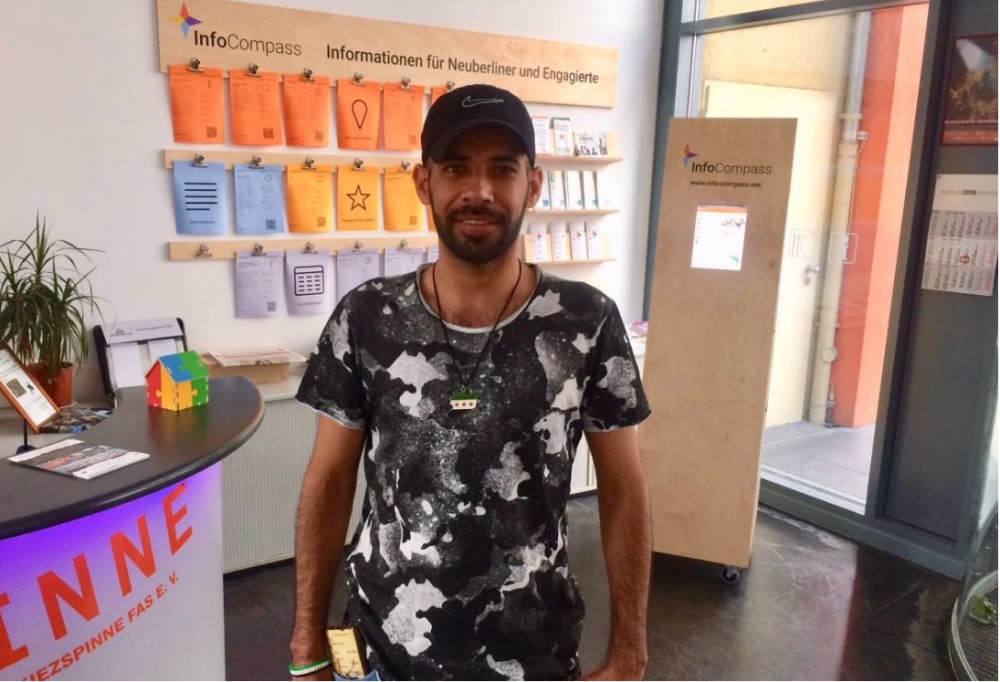
LEE MANNION, of Thomson Reuters Foundation, reports on how an educational initiative in Germany is helping refugees settle into schools…
In the light-flooded reception of a community centre in east Berlin, Syrians – whose first language is Arabic – practised German, their conversation occasionally punctuated by laughter as they stumbled over a word or mixed up languages.
While they learned, their children were given extra tuition by Back on Track Syria, a social business that helps young refugees and asylum seekers settle in German schools after losing years of education to war.

Moro Alali, a teacher with Back on Track Syria, at the Kiespinne Community Centre in Berlin, on 21st June. PICTURE: Lee Mannion/Thomson Reuters Foundation.
“I was very afraid for my children. My daughter was going to school and every day bombs were falling down,” said Shereen Sido Resho from Aleppo, whose two children are being taught by the organisation. She has been in Germany for two years.
“The children come here and they are playing. They have new friends. It’s not only about the teaching. And I like how we are sitting and speaking German together.”
“The children come here and they are playing. They have new friends. It’s not only about the teaching. And I like how we are sitting and speaking German together.”
– Shereen Sido Resho from Aleppo, whose two children are being taught by Back on Track Syria.
With an influx of more than 1.6 million asylum seekers into Germany since 2014, mainly from the Middle East and Africa, integration is a hot political issue for Chancellor Angela Merkel whose conservatives have lost ground to the far-right.
Hundreds of people have created organisations to help newcomers settle in and build ties, with efforts ranging from sports clubs and music groups that include migrants to recruitment agencies specialising in finding refugees work.
The government has provided grants since 2015 to social enterprises working to help refugees get jobs and integrate. While some have taken off, others have struggled to find ways to use business, not charity, to solve social problems.
Petra Becker started Back on Track Syria in a refugee shelter in 2016, with Syrian teachers she recruited via Facebook giving lessons to 200 children, before moving to two of the city’s cultural centres.
Ms Becker realised that young Syrians needed extra coaching after she struggled to get her own children into Berlin schools when her family returned from Damascus in 2012, where she had been working in the German embassy.
“Lots of headmasters whom I talked to, to get them into German school, had prejudices about the Syrian school system – they didn’t trust that they had enough knowledge to cope with school here,” she told the Thomson Reuters Foundation.
“That made me wonder what happened to the children who didn’t speak German.”
But Back on Track Syria runs on a shoestring budget, with scant government funding and no fees from parents. Although Ms Becker received business advice from a social enterprise accelerator, she still spends half of her time fundraising.
“Whenever we do workshops…they tell us to take money from the parents, but they don’t have money,” she said.
“And if we did, they wouldn’t send their children anymore.”
She hopes to win a government contract to pay her bilingual volunteers to provide refugee children with the extra support they need to catch up with the curriculum and improve their German within ordinary schools.
But the government is keen to rein in welfare costs as public anger towards migrants helped propel The Alternative for Germany (AfD) into parliament last year – the first far-right group to win seats in more than half a century.
Germany expects to spend around €78 billion on migration-related issues through 2022, with social payments accounting for about €21 billion and €13 billion to be spent on language courses and other integrative measures.
Social enterprises struggle to win government contracts, which have traditionally gone to about half a dozen welfare organisations, because many people do not understand what they are, said Markus Sauerhammer, an advocate for the sector.
“A lot of them are between business and welfare organisations – they are a hybrid of both,” said Mr Sauerhammer, who set up the Social Entrepreneurship Network Germany in September, to help start ups grow into successful businesses.
“When I came to school here it was difficult because I couldn’t speak German well and now I am the best in my class in Maths and English. This was because Back on Track helped me.”
– Masa Zughbi, 13.
“It’s not so easy to find the right way to finance them.”
About 250 organisations have already joined his network, including Ashoka, a US-headquartered pioneer in the field, and the Social Impact Lab, which mentors and trains social entrepreneurs.
Reliable financing would enable Ms Becker to help more children like 13-year-old Masa Zughbi, who left Idlib, a northern Syrian city close to the Turkish border, in 2013, after it was seized by groups opposed to President Bashar al-Assad.
“I can’t learn in Syria – it’s better for me here,” said Zughbi, who, like many girls her age, struggled to resist the pull of her smartphone as she spoke.
“When I came to school here it was difficult because I couldn’t speak German well and now I am the best in my class in Maths and English. This was because Back on Track helped me.”





